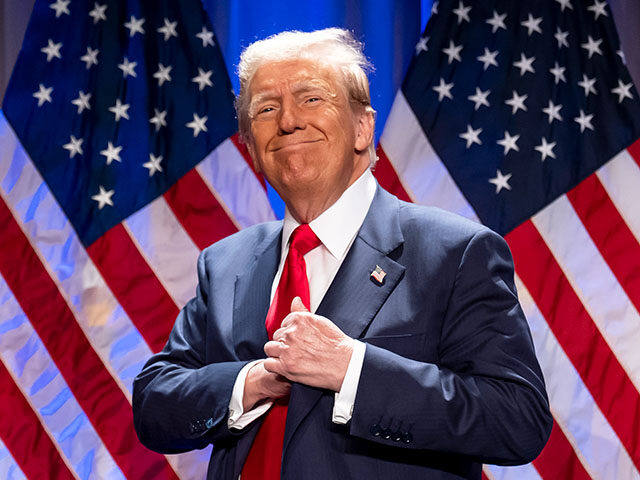‘I’m Pretty F*cking Scared:’ Members of the Censorship Cartel Fear Donald Trump’s Presidency:
Donald Trump’s vow to dismantle the censorship cartel of “misinformation” researchers, media blacklisters like NewsGuard, and Big Tech has sent shivers through the academic community that has dedicated itself to censoring conservatives.
The Financial Times reports that since Donald Trump’s election victory, researchers and academics who study alleged digital “misinformation” are growing increasingly worried that the new administration will follow through on campaign threats to crack down on their work. During the campaign, Trump said he would seek to curb federal funding to universities found to have engaged in censorship activities like flagging conservative social media content for removal.
The seriousness of Trump’s intentions has been underscored by his pick of Brendan Carr, a Republican FCC commissioner and vocal critic of Big Tech censorship, to chair the agency. Trump’s anti-censorship crusade has also garnered public support from Silicon Valley figures like venture capitalist Marc Andreessen and Twitter owner Elon Musk.
“I think it will be just a tsunami of critiques and witch hunts,” warned Megan Squire, deputy director for data analytics at the left-wing Southern Poverty Law Center. “I suspect some people in academia where you get to choose your research will self-censor or soften their research, or shift their application area.”
Some misinformation researchers say they fear for their jobs and research funding if Trump follows through on his threats. “I’m pretty fucking scared,” said one professor who studies the field, speaking anonymously due to fears of retribution. “If this stuff happens, I will be on a plane [out of America].”
Trump and allies like Musk argue the misinformation field has enabled the government, academia, blacklist organizations like NewsGuard, and tech companies to collude to suppress conservative speech under the guise of combating fake news. “Every participant in the orchestrated government-university-non-profit-company censorship machine of the last decade can be charged criminally,” venture capitalist Marc Andreessen alleged on X. --->READ MORE HERE
Donald Trump’s return sends shivers through the anti-misinformation world:
Vow to crack down on the ‘censorship cartel’ has researchers worried — and Big Tech is on notice
The incoming Trump administration’s vow to dismantle the leftwing “censorship cartel” has thrown a shadow over the cottage industry of academics, non-profits and researchers that sprang up to combat a tide of digital misinformation — and threatens to disrupt the Big Tech companies behind the world’s most popular platforms.
Researchers fear Donald Trump will make good on his past promises to crack down further on the misinformation field in the US for alleged “election interference”. Among those threats, he has said he would seek to curb funds to any universities found to have engaged in censorship activities “such as flagging social media content for removal or blacklisting” for at least five years.
He has signalled the seriousness of his intentions by choosing Brendan Carr as the new chair of the Federal Communications Commission. The Republican commissioner has echoed the forthcoming president’s rhetoric on “free speech” and “dismantling censorship”. Trump’s efforts have also received public support from Silicon Valley heavyweights, including a16z co-founder Marc Andreessen and billionaire entrepreneur Elon Musk, now one of the president-elect’s most visible allies.
“I think it will be just a tsunami of critiques and witch hunts,” said Megan Squire, the deputy director for data analytics at the Southern Poverty Law Center. “I suspect some people in academia where you get to choose your research will self-censor or soften their research, or shift their application area.”
“We are all just waiting with bated breath,” she added.
“I’m pretty fucking scared,” said one professor in the field, speaking on condition of anonymity due to fears of retribution. “If this stuff happens, I will be on a plane [out of America].”
Another professor said the rhetoric had placed pressure on individuals but also universities and colleges at an institutional level, and that discussions were being held internally about how to prepare. “It’s an existential threat to my livelihood and [our] research funding.”
Social media platforms could also be targeted, as Trump has suggested he would seek revisions to Section 230 of the Communications Decency Act, which grants social media companies immunity from being sued for content that appears on their platforms. Doing so, he said, would “get platforms out of censorship business”.
Shortly before his nomination, Carr wrote on X that Meta’s Mark Zuckerberg, Google’s Sundar Pichai, Apple’s Tim Cook and Microsoft’s Satya Nadella “played central roles in the censorship cartel” by working with NewsGuard, a for-profit fact-checking group that rates the quality and trustworthiness of news sites. Carr sent a letter to the executives asking for information on their involvement with the group, which maintains that it is apolitical.
The notion of misinformation — false information that may be shared unwittingly — and disinformation — shared with explicit intent to deceive — exploded into the mainstream following Trump’s 2016 win, after US investigators found evidence that a Russian troll farm had sought to interfere in the vote. --->READ MORE HERE
If you like what you see, please "Like" and/or Follow us on FACEBOOK
here, GETTR
here, and TWITTER
here.



No comments:
Post a Comment